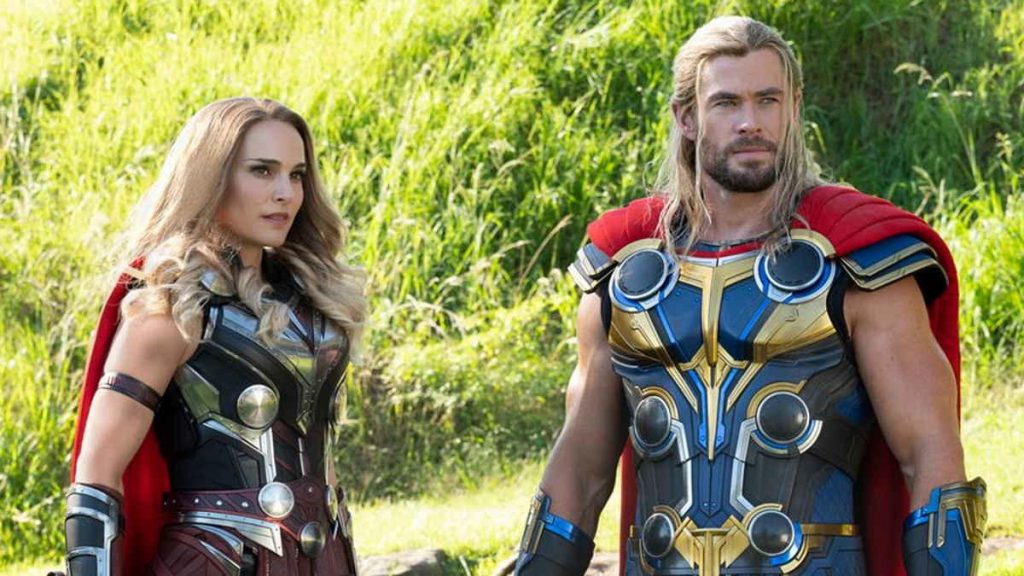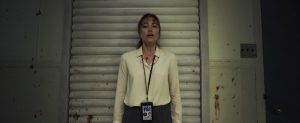Reviews include Deadpool & Wolverine, Doubles, and Mountain Queen: The Summits of Lhakpa Sherpa.
TFCA Friday: Week of July 8
July 8, 2022

Welcome to TFCA Friday, a weekly round-up of film reviews and articles by TFCA members.
In Release this Week
Apples (dir. Christos Nikou)
“The film skillfully and imaginatively presents the painful details of life without memory, the inability to get a job, travel, or function as one once did, like ageing suddenly. Aris eats bushels of apples, one retained habit from his life earlier that day, before he was seized by amnesia,” notes Anne Brodie at What She Said. “Nikou puts Aris on a profound journey as we wonder what our place is on this earth, and it pulls no punches. Who are we without memory?”
“Like its protagonist, Nikou’s film is quiet. And, although it has charm and is engaging, the tone is mostly somber,” observes Karen Gordon at Original Cin. “That includes the look of the film. The colour palette, is subdued tones of greys, browns and blues. As well, the film was shot it in the 4:3 aspect ratio, which brings us closer to Aris, contributing a feeling of intimacy which is important here.”
“The film’s lackadaisical pacing and the understated nature of its revelations will not be to all tastes,” advises Chris Knight at the National Post. “But if you have ever pondered the question of whether we are all just the sum of our memories, or wondered what it would be like to wipe your brain’s hard drive and start anew, then Apples will provide food for thought, and won’t be easily forgotten.”
“It’s hard to be more au courant than Apples, the Greek existential character study that is the first film by Christos Nikou, a former collaborator of Yorgos Lanthimos (now world famous since The Favourite),” notes Marc Glassman at Classical FM. “Nikou has crafted a fable, a thoughtful thriller, around a pandemic in which vast swaths of the population have succumbed to amnesia. As Apples demonstrates, you don’t have to titillate audiences when they’re already intrigued by dark thoughts of Covid and Alzheimer’s. We’re already intrigued by the premise and want to know where Nikou’s script and direction will take us.”
“Nikou’s film requires patience and director Nikou takes his time to tell his story,” observes Gilbert Seah at Afro Toronto. “The film also has a sort of Kafka-ish feel, which might interest those who like this sort of atmosphere. However, many will find the film frustrating as the film has the feel that it leading nowhere.”
“[T]he end result might have been all too controlled, too gratingly measured, were it not for the casting of Servetalis, whose performance grounds the antics with a poignant, empathetic sense of loss,” writes Barry Hertz at The Globe and Mail. “The actor simply has a face built for shouldering all of the world’s many questions and anxieties – we’re able to invest ourselves in Nikou’s world because we can so easily see ourselves in Servetalis’s character. Lost, confused and hungering for just a brief bite of sweetness in a reality gone sour.”
Both Sides of the Blade (dir. Claire Denis)
At Toronto Franco, Gilbert Seah calls it “a sharp cutting look at the insides of a relationship, of how one can be torn cut open and torn apart.”
“Fuelled by a ferocious performance by Binoche, Sara is a complicated character who plays by her own rules,” writes Pat Mullen at That Shelf. “oth Sides of the Blade finds power in passing glances, hints of longing, and words lobbed like grenades into quarrels. Where Let the Sunshine In sees Binoche explore her character’s vulnerability, Blade cuts from the other angle.”
Dreaming Walls: Inside the Chelsea Hotel (dir. Maya Duverdier and Amélie van Elmbt)
“The young Belgian directors Amélie van Elmbt and Maya Duverdier’s dreamy, poetic documentary about the Chelsea, Dreaming Walls, is woefully lean on the specifics of the hotel’s legendary status but it does offer a recording of the great poet [Dylan Thomas] declaiming: ‘Do not go gentle into that good night, / Old age should burn and rave at close of day; / Rage, rage against the dying of the light,” notes Marc Glassman at Classical FM.
“Meet long-term resident choreographer Merle Lister, a former dancer now dependent on her walker as she patrols the halls, practices her dances – gently- on the staircase, and waltzes with the construction workers,” writes Anne Brodie at What She Said. “It’s a rapidly changing environment and you get the sense it will be transformed to look like any other luxury hotel in New York.”
“Beauty and loss hold hands in Dreaming Walls: Inside the Chelsea Hotel, an intimate and impressionistic documentary about New York’s storied Chelsea Hotel from Belgian filmmakers, Amélie van Elmbt and Maya Duverdier. The film focuses on a handful of remaining residents, holdouts in the rent-controlled apartments, immersed in an apparently interminable renovation,” says Liam Lacey at Original Cin. “Even at a short 80 minutes, the film feels casual and fragmentary. The filmmakers presume an audience already familiar with the well-chronicled red-brick West 23rd Street monument to New York’s bohemian past, focusing instead on its faded grandeur and chaotic reconstruction.”
“I wish there was a little more of the old days in the film, a greater focus on such famous former residents as Oscar Wilde, Arthur C. Clark (who wrote 2001: A Space Odyssey there) or Leonard Cohen, who had a brief romance with Janis Joplin there, and then wrote a song about it,” admits Chris Knight at the National Post. “But the film is what it is. And at 80 minutes, at least it knows not to linger past checkout time.”
“What the audience sees for the most part of the doc is a dilapidated building full of elderly complaining residents in a depressing atmosphere,” admits Gilbert Seah at Afro Toronto.
“It’s a poignant study of a creative hub that preserves in film what developers discard to the dumpster,” says Pat Mullen at POV Magazine. “Duverdier and van Elmbt therefore offer a fond ode to this gathering site of a once-thriving arts scene Dreaming Walls astutely considers how sites of history are defined not by the bricks, girders, and drywall that comprise them, but by the lives that pass through them and the experiences created within. People come and people go in grand hotels, but the ones who stay ultimately define them.”
The Fourth of July (dir. Louis C.K.)
“The first act plays out like a minor Woody Allen movie, with the city playing the part of stark mood-setter. But that all changes when Jeff decides to use the occasion of his dysfunctional family’s annual get together in Maine for the Fourth of July to throw his traumatic childhood at their feet,” writes Jim Slotek at Original Cin. “Fourth of July is meant to be a comedy, but isn’t in the sense that there is nothing funny enough to laugh at. It is a domestic car crash with no edge or purpose.”
“It is not as if Fourth of July is bad because it is a movie directed, co-written and co-starring C.K., a man who you might despise, tolerate, be completely unaware of or even adore in a fashionably contrarian manner,” observes Barry Hertz at The Globe and Mail. “This film is a dud all on its own, a watered down Woody Allen facsimile that is long on F-bombs and short on wit, with an internal logic that falls apart with barely a half-cocked glance.”
Girl in the Picture (dir. Skye Borgman)
“Girl in the Picture serves as both a doc and a true to life horror movie,” says Gilbert Seah at Afro Toronto. “If you want to see a real horror film, Girl in the Picture is the one.”
Neptune Frost (dir. Saul Williams and Anisia Uzeyman; July 10)
“Saul Williams and Anisia Uzeyman’s Neptune Frost, an ‘Afrofuturist sci-fi musical’ produced by bad boy Ezra Miller and music gadfly Lin-Manuel Miranda is a musical science fiction smorgasbord that challenges our notions of what is film,” raves Anne Brodie at What She Said. “It is a breakthrough in cinema, gentle, outrageous, bombastic, and wholly engaging…It’s a must-see that will fire the imagination.”
The Road to Galena (dir. Joe Hall)
“Thankfully not sappy, it’s a tough story with situations that represent corporate greed, economic constraints, and the validity of working for a dream of wealth, cars, mansions, and the cost of ‘the good life’. Interesting,” notes Anne Brodie at What She Said.
https://www.youtube.com/watch?v=Atj8Ga8Sd_A
The Sea Beast (dir. Chris Williams)
At the Toronto Star, Marriska Fernandes calls the film “an epic journey into uncharted waters” and chats with director Chris Williams about honing his chops in animation at the University of Waterloo and Sheridan College, and of finding early inspiration in adventures like Raiders of the Lost Ark: “I feel like I left that theatre just changed by the experience,” says Williams. “I remember as a kid, processing the experience of watching the movie and recognizing that adults made this thing and they must love the same things I loved. It was almost reassuring that I could grow up and still continue to love the same things that I love now, and I left that movie really wanting to make movies.”
Thor: Love and Thunder (dir. Taika Waititi)
“While it’s tempting to compare Love and Thunder to Ragnarok, it’s worth pointing out the 2017 film had screenwriters Eric Pearson, Craig Kyle and Christopher L. Yost wrestling the story into shape. As director, Waititi cut through the self-serious bravado, encouraging his actors to be loose and vulnerable,” observes Eli Glasner at CBC. “Presumably encouraged by the success of Ragnarok, Marvel let the director go full Waititi for Love and Thunder, but the result is a story that feels familiar and flabby at the same time.”
“[T]he latest Thor turns out to be quite funnier, funnier than most films in the MCU and far too funny for its own good,” admits Gilbert Seah at Afro Toronto. “The story seems all over the place, and the hilarity compromises the action set-prices which are supposed to put audiences at the edge of their seats in Hollywood blockbusters such as this one.”
“What Waititi can’t do so well is the same trick twice, which is essentially what he’s attempting to pull off with Thor: Love and Thunder,” yawns Peter Howell at the Toronto Star. “He ups the absurdity and the antics from his first go at the Norse myth narrative, with many recycled gags and diminishing returns. The chubby Ragnarok Thor returns briefly in Love and Thunder, but his girth no longer raises an eyebrow or a chuckle. Thor also dresses up as a hot dog and in one scene nothing at all — the latter recalls the Hulk’s bare-assed buffoonery from Ragnarok.”
“After 28 films, it’s incredible that Marvel studios has anything new to say, never mind the ability to be fresh and entertaining,” notes Karen Gordon at Original Cin. “Love and Thunder is less broadly comic than Ragnarok, but it still leans heavily on humour, Waititi-style, by which I mean sly, silly, smart, and smart-alecky. And thanks to Waititi’s crisp editing, the film’s comedic timing is impeccable.”
“What was initially a colourful wink-wink diversion is now a full-throated wail so self-important that no snippets of irony can alleviate its exhausting rock ‘n’ roll egotism,” declares Barry Hertz at The Globe and Mail. “It is not only the narrative and characters of Love and Thunder that are limp, though – Waititi’s visual style feels absolutely drained, flattened and motion-smoothed to lifeless nothingness. It is as if the director became so flummoxed or exhausted, or both, by the MCU’s creative constraints that he gave up on the power of the camera entirely.”
“Taika Waititi’s Thor: Love and Thunder is bonkers in the best possible way,” laughs Marriska Fernandes at Exclaim!. “It’s silly, laugh-out-loud funny and never takes itself too seriously. For those who have been living on a steady diet of Marvel films, this one delivers hilarious one-liners, jabs and Easter eggs.”
At Elle Canada, Marriska Fernandes chats with Love and Thunder star Natalie Portman about working with Taika Waititi and finding inspiration in everyday superheroes: “Probably all of the working moms I know – I think are really superheroes,” says Portman. “I think in particular, in Los Angeles, there’s a woman, Susan Burton, who has led a women’s re-entry program for justice-impacted women. She’s just a force, she’s an angel from another dimension who came to Earth and is doing that kind of good work here. And I’m just in awe of her every day.”
“[I]t’s hard to spoil a movie that’s already gone bad,” says Chris Knight at the National Post. “But the rest of the movie is a bit of a wash. Even the climactic battle feels uninspired, like the film is just going through the motions on its way to a resolution and a couple of post-credit sequences.”
Stream On!
At Yahoo Canada, Marriska Fernandes highlights what’s new to streaming this month, including Rogers Best Canadian Feature nominee Scarborough, which is now on Crave: “Winner of eight Canadian Screen Awards and an official selection of the 2021 Toronto International Film Festival, this Canadian film is adapted from the critically acclaimed novel by Catherine Hernandez,” writes Fernandes. “It is an unflinching portrait of three, low-income families struggling to endure within a system that has set them up for failure.”
A Festival of Festival Coverage: The TIFF Trickle
Are you also dreaming about TIFF line-up announcements so that you can lock in a magazine cover? The news is coming slowly but steadily-ish as Barry Hertz reports at The Globe and Mail that Clement Virgo’s Brother is the second film announced for TIFF in a one-by-one rollout: “Like last week’s Knives Out announcement, TIFF once again did not indicate on Wednesday where in its programming slate Brother would appear, including whether or not the film would open or close the festival. Still, the announcement heralds a hometown celebration for Virgo, whose debut feature, the crime drama Rude – the first Canadian dramatic feature film to be written, directed and produced by an all-Black team – made its Canadian premiere at TIFF back in 1995.”
At POV Magazine, Pat Mullen reports on the Industry Conference plans for TIFF 2022: “2022 marks a return to live industry events after the festival was forced to pivot to Zoom when COVID-19 and travel restrictions made in-real-life events impossible,” writes Mullen. “This year’s Industry Conference won’t see the return of the popular Doc Conference, although documentary-focused programming by Thom Powers will be part of the five-day summit.”
TV Talk / Series Scribbles: Hooray for Hauser!
“At Original Cin, Liam Lacey checks out the mystery mini Black Bird starring Taron Egerton and the late Ray Liotta. “The idea that it takes a predator to catch one isn’t entirely wasted. And at its best moments, Black Bird recalls David Fincher’s hair-raising Netflix series Mindhunter, about weird FBI agents developing serial killer profiling in the ‘70s. Although Black Bird focuses on just one creepy killer, who, in this case, is a doozy,” writes Lacey. “The highpoint of the series is emphatically the performance by Hauser, a comedian and actor who plays schlubby fall guys exceptionally well.”
At What She Said, Anne Brodie agrees that the star-studded Black Bird finds an unexpected scene-stealer in Paul Walter Hauser: “It’s gritty and dark as such stories will be but Hauser’s first-rate acting is my prime takeaway. His vocal performance helps paint a psychological portrait of a man who has trouble discerning reality from waking dreams, has little control of his mind, and is extremely vulnerable.” Skymed, meanwhile, lets a new Canadian procedural take off: “It looks at sexism in aviation, remaining professional under tough odds and interpersonal themes in ways that are inspiring, and entertaining and offer lessons about underserved Canada.” Gardeners’ World, though, offers some handy tips for aspiring green thumbs: “[Host Monty Don] shows in detail how to prune for vigorous regrowth, how to divide plants for multiple new plants, the health benefits of a green canopy, how to reduce noise with greenery, dig-free gardening, and so much more.” But don’t spoil your appetite for the return of The Great British Baking Show. Anne gives a taste of what’s on the menu: “Among the first challenges, are rolled sponges, malt loaves, anti-gravity spectaculars, filled brandy snaps, jammy dodgers, and mechanical baked toys.”



